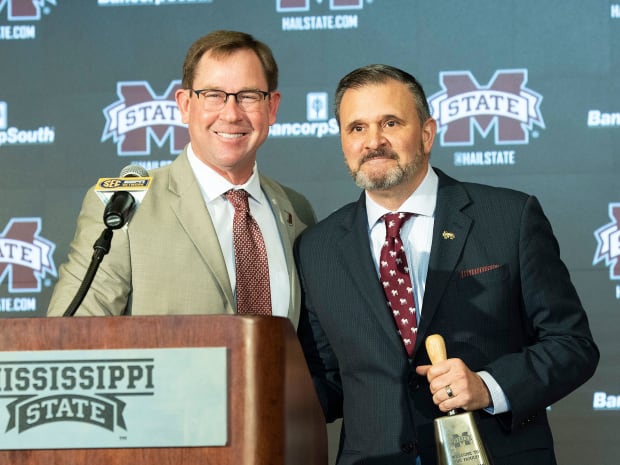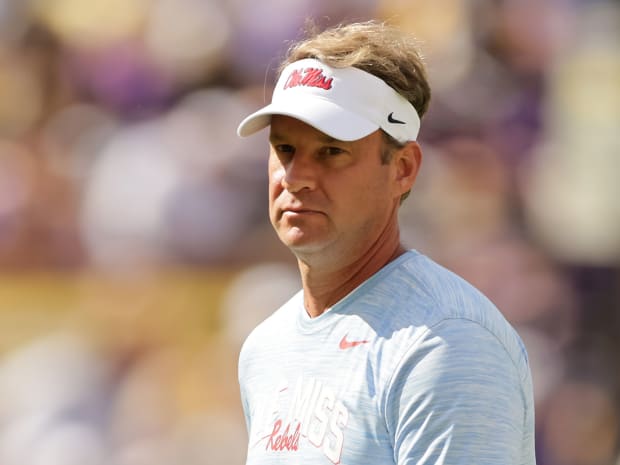In May, Lane Kiffin leaned back in his chair, stared across his desk and pointed toward a reporter with a prediction.
You watch, he said, at how many coaches decide to move jobs for reasons involving name, image and likeness.
“[Say a] coach is down to these four jobs. Well, before, [the decision was based on] facilities or whatever,” the Ole Miss coach says. “If the coach is smart, the first question should be what?”
Tell me about your NIL collective?
“Exactly,” Kiffin responded. “It used to be the stadium, conference, assistant pool, your salary … nope. First question should be, ‘What is your NIL structure?’”
Five months later, as college football is on the cusp of its annual Silly Season, where coaching movement dominates headlines, one SEC school lost its athletic director to another SEC school. And while there are an assortment of reasons that John Cohen left Mississippi State for Auburn, one of the foremost is that three-letter phrase: N-I-L: name, image and likeness.
What’s even more intriguing is that Auburn’s search for its next football coach could very well center on Kiffin himself.
Could NIL actually bring together both Mississippi State’s former athletic director and Ole Miss’s current football coach? While it may seem like a bizarre marriage, this is Auburn—Land of the Bizarre. And this is the SEC, where it just means more (absurdity).
The Tigers ended Bryan Harsin’s tenure Monday, even before they announced the hire of Cohen, a strategic move that frees the athletic director from the responsibility of dismissing the coach. Instead of beginning his tenure on the Plains with a firing, the 56-year-old Cohen can start the search for Harsin’s replacement (we’ll get back to that later).

Barbara Gauntt/Clarion Ledger/USA TODAY Network
A former baseball coach at both Kentucky and Mississippi State, Cohen is intense and passionate, one of the loudest voices in the SEC leadership room. He is detail oriented, incredibly organized and meticulous down to the smallest of matters. He’s a note-taker and a note-keeper.
Originally from Tuscaloosa, Ala., he is an outside-the-box thinker—as is one of his close friends and his predecessor at State, Florida AD Scott Stricklin. Like Cohen, Stricklin is a Mississippi State alum who left his alma mater for similar reasons five years ago, moving to a better-resourced program in the league where money isn’t as much of an object.
The SEC footprint is a smaller version of the national landscape in terms of disparities among schools. The league has its haves and have-nots. For instance, Mississippi State has the third-smallest budget in the SEC, after Missouri and Vanderbilt. It’s roughly $15 million behind Auburn and $60 million behind Alabama, according to figures released last year. For years, the program has followed a do-more-with-less mentality, but that hasn’t stopped an exodus from the AD chair.
Watch college football with fuboTV. Start your free trial today.
Cohen is the third former State AD who is now presiding over an SEC athletic department elsewhere, joining Stricklin (Florida) and Greg Byrne, a mentor of sorts to Cohen, who left State in 2010 for Arizona and then was hired at Alabama. The three men, in fact, were all in Starkville at the same time: Cohen as baseball coach, Stricklin as deputy athletic director and Byrne as athletic director. (Byrne and Stricklin heavily involved Cohen in critical administrative decisions, even incorporating him in the interview process for head coaches; he was along for the ride in Byrne’s hire of Dan Mullen).
But back to those resources.
In this age of athlete compensation, many believe that the gap between the haves and have-nots will only widen—both nationally and in the SEC. A place struggling to amass enough in NIL dollars will have trouble (1) signing players; (2) retaining players; and thus (3) competing for championships. The latter is a significant thing for a man as competitive as the fiery Cohen, whose dugout outbursts as a baseball coach are well known.
Mississippi State’s endeavor into NIL has not been as fruitful as others’. While collectives at the elite of FBS programs are announcing fundraising in the multi-millions, the Bulldogs’ collective efforts are nowhere near that level, according to those with knowledge of the subject.
The collective affiliated with Auburn has announced that it has more than $12 million in NIL pledges.
“NIL collectives, and how well funded and operated they are, are newly important factors in the retention of coaches and higher level administrators,” says Mit Winter, a sports attorney based in Kansas City and an expert on NIL matters. “Coaches and administrators want to win. They also want to keep their jobs. A well-funded collective is going to help with both of those things.”
At Auburn, Cohen arrives at a place that is one of the more fractured situations in the country, often hindered by heavily involved boosters and board members. For years, the authority at Auburn has come from those outside of the athletic department, using their power and influence to insert themselves into decisions and sway movement. It has produced some confounding decisions. Let history be your guide.
In 2003, Auburn decision-makers flew to meet with then Louisville coach Bobby Petrino in a covert attempt to replace sitting coach Tommy Tuberville. Media exposed the trip, the decision-makers were embarrassed, and they had to apologize. Tuberville went undefeated the next season.
The school toyed with firing Gus Malzahn in 2016 only to then give him a contract the next year with a hefty buyout. Three years later, the school did fire him and had to pay him $21 million—one of the largest buyout sums paid to a coach in college football history.
And then came the latest drama, which will end with the school having a new president (Chris Roberts, hired in February), new athletic director (Cohen) and football coach (Harsin’s replacement). Over the summer, Auburn pushed out AD Allen Greene, hired in 2018, to pave the way for its latest coaching change.
Twenty-one games into Harsin’s tenure—a peculiar fit to begin with—he’s gone, and he gets $15.5 million in buyout cash. Like Malzahn, Harsin’s buyout is not mitigated by any additional salary he receives in future jobs. Coupled with staff buyouts, Auburn has paid more than $45 million in buyout money over the last five years. That’s more than the Big 12 distributed to each of its schools last year. The infighting on the Plains has even scared away coaching candidates in the past, such as Billy Napier and Brent Venables, two men interviewed during the search for Harsin.
But despite its internal strife, Auburn proves every so often that it can field a championship-worthy football team—a sign that the program, if rowing in the same direction, can achieve plenty. In the last 12 years, Auburn has won three SEC West titles, two SEC championships and has twice played for the national title, winning it in 2010. In 1993 and 2004, the Tigers went undefeated. At one point, as hard as it is to believe, they beat Alabama six straight years under Tuberville—a run that ended in Nick Saban’s second year in Tuscaloosa.
Whether Cohen can wrangle the boosters is another matter. His contract is expected to be five years in length with an annual salary of about $1.5 million, sources tell Sports Illustrated. Most important, maybe, is that Roberts and others at Auburn gave assurances that he’d have authority over the athletic department. It’s a promise that many will say is sure to eventually be broken.

Stephen Lew/USA TODAY Sports
In fact, as Cohen’s name leaked over the weekend in media reports, some Auburn influencers pushed back against the hire. Is it a sign of more unrest to come? Maybe.
But there are plenty of benefits to being at Auburn. The quaint college town is in a talent-rich area, just north of one of the country’s most fertile recruiting states (Florida) and just south of one of the country’s most fertile recruiting cities (Atlanta). It has plenty of money, resides in the most successful college football conference and, after the completion of its new football building, will have fine facilities. And while it must each year compete with arguably the greatest football program in NCAA history, the leader of that program just turned 71.
Oh, and there’s NIL, too. In fact, Auburn’s roster is in need of a serious makeover, and there’s only one real way to do that: making good use of the collective’s money.
Maybe that someone is a guy who coaches a school in Oxford, Miss.? Most believe Kiffin is moveable from Ole Miss, and he knows NIL well. Because of his aggressive efforts, Ole Miss went from having disorganized NIL efforts to consolidating its collectives into one place—something the school announced in a news conference earlier this month that featured current athletes, coaches, boosters and administrators.
Is Kiffin happy enough with the NIL efforts of his school? Does he believe he can win it all there?
These are probably similar questions that Cohen asked himself about his alma mater.
But there are plenty more candidates to replace Harsin, including another one with Ole Miss ties. Hugh Freeze has Liberty (7–1) barreling toward its fourth straight season of at least eight wins. His firing with the Rebels stemmed from an NCAA investigation and off-the-field scandal that many believe prevented him from previously landing a job back in the SEC (like, say, Auburn when it hired Harsin).
While Kiffin and Freeze are creative offensive minds, similar to the men Cohen hired at Mississippi State (Joe Moorhead and Mike Leach)—they come with their own issues. Is it enough to prevent such a move? Will Cohen have full authority to hire the next coach?
These are questions that, for now, don’t have answers. What is known, though, is that NIL is driving some of the biggest moves in college football. And that should surprise no one.
Just listen to the current coach at Ole Miss.
“A lot of people sit back and say, ‘Oh, it will go away. NCAA will fix it!’” Kiffin said in May. “O.K. Go ahead and wait. As a coach and AD, you won’t be there. There will be a new coach and AD. It’s here. I don’t spend time like others, ‘How long is it here? How are they going to fix it!?’
“I don’t care. It’s here.”







